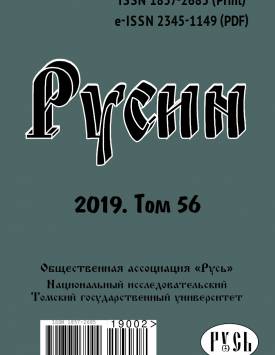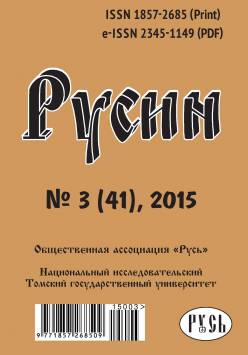-
9–15
Rezanova Zoya I. Editorial // Rusin. 2019. № 56. P. 9–15. DOI: 10.17223/18572685/56/1
HISTORY
16–33
Sulyak Sergey G. I.I. Sreznevsky and Carpathian Rus' // Rusin. 2019. № 56. P. 16–33. DOI: 10.17223/18572685/56/2
34–57
Malinov Alexey V., Milczarek Michat The Idea of Common Slavic Language: from J. Krizanic to V.l. Lamanskii // Rusin. 2019. № 56. P. 34–57. DOI: 10.17223/18572685/56/3
58–76
Savchuk Boris P., Bilavych Galyna V. The "Alphabet Wars" of 1830-1850s in Galicia in Contemporary Scientific Discourse // Rusin. 2019. № 56. P. 58–76. DOI: 10.17223/18572685/56/4
77–91
Zelenko Sergey V. Language Contacting of Rusins in the Works by Alexander Dukhnovich // Rusin. 2019. № 56. P. 77–91. DOI: 10.17223/18572685/56/5
92–109
Dodonov Roman O., Aleksandrova Olena S., Dodonova Vera I. Rusin History in the Creative Legacy of Vladimir Vernadsky // Rusin. 2019. № 56. P. 92–109. DOI: 10.17223/18572685/56/6
110–125
Bakhturina Alexandra Yu. Formation of Civil Administration in Bukovina in the Documents of the Supreme Commander Headquarters and the Foreign Ministry of the Russian Empire in 1914-1915 // Rusin. 2019. № 56. P. 110–125. DOI: 10.17223/18572685/56/7
LITERATURE AND LITERARY THEORY
126–148
Sharov Konstantin S. Mythological Dependency of Understanding Proper Names as Linguistic Cultural Signs in the West Russian Literary Homiletics of the Late Seventeenth Century // Rusin. 2019. № 56. P. 126–148. DOI: 10.17223/18572685/56/8
LINGUISTICS AND LANGUAGE
149–165
Starikova Galina N. The Nominative Composition of the Rusin Language as the Evidence of the Culture-Specific Living Conditions of the People // Rusin. 2019. № 56. P. 149–165. DOI: 10.17223/18572685/56/9
166–178
Tolstik Svetlana A. The Concept “Pity” in the History of the Rusin Language // Rusin. 2019. № 56. P. 166–178. DOI: 10.17223/18572685/56/10
179–197
Vostrova Yulia A., Fil Yulia V. Ahead or Before? About Russian and Czech Verbs with the Prefix рred- / рřed- // Rusin. 2019. № 56. P. 179–197. DOI: 10.17223/18572685/56/11
198–212
Gridina Tatiana A., Konovalova Nadezhda I. Zoomorphisms as the Basis for Modelling Phraseological Semantics: Russian-Polish Equivalents // Rusin. 2019. № 56. P. 198–212. DOI: 10.17223/18572685/56/12
213–225
Nagel Olga V., Temnikova Irina G. The Tatar Language Transfer in the Speech of Tatar-Russian Bilinguals // Rusin. 2019. № 56. P. 213–225. DOI: 10.17223/18572685/56/13
226–241
Lebedeva Natalya B., Rabenko Tatyana G. The Commonplace Semantics of Bionyms in Slavic and Non-Slavic Linguistic Cultures (the Results of the Experiment) // Rusin. 2019. № 56. P. 226–241. DOI: 10.17223/18572685/56/14
242–253
Feysa Mikhaylo The Bachka-Srem Rusin Animal Idioms and their English Equivalents // Rusin. 2019. № 56. P. 242–253. DOI: 10.17223/18572685/56/15
254–266
Koporova Kvetoslava Morphonology of Rusin: Current State and Research Results // Rusin. 2019. № 56. P. 254–266. DOI: 10.17223/18572685/56/16
ANTHROPOLOGY
267–293
Tubalova Inna V., Wang Ghya Somatic Code in East Slavic Lyrical Songs // Rusin. 2019. № 56. P. 267–293. DOI: 10.17223/18572685/56/17
294–311
Artemenko Elena D., Bub Aleksandra S. Dynamics of Sociolinguistic Situation of Khakass-Russian Language Interaction in South Siberia // Rusin. 2019. № 56. P. 294–311. DOI: 10.17223/18572685/56/18
SOCIOLOGY AND POLITICAL SCIENCE
312–327
Emer Yulia A., Akenteva Ksenia A. Transformation of the Genre of “Congratulation” in the Eastern Slavic Countries Presidential Discourse // Rusin. 2019. № 56. P. 312–327. DOI: 10.17223/18572685/56/19

